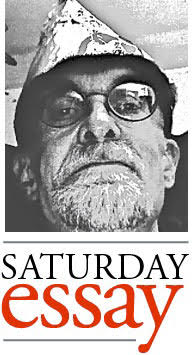Hell of a View
 Not having grown up in Duluth, I missed the purported crosstown rivalry. My tribe lives next door, across the border: the People of the Cheese.
Not having grown up in Duluth, I missed the purported crosstown rivalry. My tribe lives next door, across the border: the People of the Cheese.
Duluth: “Where rail meets sail.” Where rustic meets rustbelt. Where woodtick meets moonbeam, and uphill meets down. You’re a microcosmic casserole, a dichotomous hotdish, Duluth, where stone meets water, and water meets sky. Actually, between water and sky is a thin slice of Wisconsin, appearing blue because of the way light scatters across the distance, and sometimes distance is good. You see, people often end a sentence with the phrase, “but there’s always Wisconsin,” as in, “we can’t get no drunker here, but there’s always Wisconsin,” or, “we don’t make lampshades from human skin, but there’s always
Wisconsin,” and so on, lending a certain comfort to the color blue, and the distance it conveys.
Driving into downtown from the west feels like entering an architect’s model, as the street burrows between stubby office buildings along the table of land between harbor and hill. When I moved here, freeway and mall had already drawn and quartered the business district, and it was the nadir of the Reagan recession. The industrial boomtown started busting as the high-grade ore played out in the 1950s, and by the late ’70s competition from abroad arrived, along with bumper stickers reading, “ Eat Your Foreign Car.” While the early ’80s were cloaked in a campaign slogan touting, “Morning in America,” around here we wondered if there was a bottom to this freefall, which might at least afford a dead-cat bounce.
Liminal Duluth. Threshold between river and lake, city and town. Between the basement bedrock of the North Shore and the sandstone and clay of the South. Thus, waves rattle on one side, and whisper on the other. Here in Inbetweensville, neither east nor west, big nor small, is a transit point between the edge of nowhere and its smack-dab middle. And you can step away, all meta-like, and look down, or back, or across at your town. From above, the clear boundaries of lake, land and sky. From across the river, distant houses on a postcard hill. From up the shore, an industrial waterfront with a scrim of motels, and the Aerial Lift Bridge — Duluth’s clunky icon in the shape of a garage door — front and center. Yet another threshold, portal between safe harbor and the gales of whenever. The shoal it connects to resembles one in Amanohashidate, Japan, where, as is the custom, people place their heads between their legs and gaze, upsidedown, at the five-mile-long, pine-tree-lined sandbar, which then appears to reach the sky. They call it the Bridge to Heaven.
On the back of the postcard you’ll find the nitty particulars of postindustrialism. Dickens would recognize the shuffling paupers, and assorted societal surplus, biding their time, a generation late for Duluth’s working-class heyday, anesthetizing themselves with an ever-expanding plethora of bad dope, and booze. Some live beneath the freeway. Of all the doorways in this city of thresholds, not one opens for them. William Falkner said, “The past isn’t dead. It’s not even past.” And so it is this frontier shivers, in the shadows of genocide, and chattel slavery.
The big lake sparkles and beckons. To the northeast you can see no end to it. It calls us to circumnavigate as if it were a sacred mountain. It’s rarely done on foot, of course, more likely on a Harley, or pulling a camper, heeding this urge to encircle, to follow from point A to point A, all directions traveled, until we lasso Superior in our mind’s eye, and haul its immensity home.
Driving toward town from Wisconsin (don’t slow down, don’t make eye contact) you come over the lip of old proto-glacial Lake Duluth, and from there you’ll see the shores of Gitchee Gumee, and the Big Sea Shining Water. I was doing this one day, at dusk, and on the radio someone was coincidentally reciting Longfellow’s poem “Hiawatha,” and there it all was in front of me, in real time — “O’er the water pointing westward, to the purple clouds of sunset.” Praise the gods of synchronicity, and cheesy old poems. And kudos to the welcoming committee.
As happens anywhere, Duluth’s landmarks fade to background after a while. The ore docks and grain elevators shrink with familiarity until they fit on the ubiquitous watercolor paintings in souvenir shops. They contract until they can be tucked into the back of our minds, along with boats a thousand feet long, too big to get past the locks on the far end of Lake Erie. Of course some of the oceangoing ships make it through, adjusting for their deeper drafts, and the lower buoyancy of fresh water compared to that of the salty sea. And this gives Duluth its most clichéd gateway — its gateway to the world. On the salties, sailing deep in the interior of North America, strange flags fly.
You can take the port for granted, but the big lake will not be ignored. The only familiar is constant flux. Sunblind silver turns to slate turns to sky-blue pink — my father’s favorite color. Clouds make mountains out of air and their doubles shimmer below. The sun rises just right, and arcs across the sky just so, but the whole show is never twice the same, and never disappoints. There’s a gravity akin to love, no matter how stoney or cold. We settle, yet thresholds open still. Lack of pretense opens doors to aquaintence, with roots often difficult to trace, or remember. When asked how we met someone, the answer is often, “ You know, it’s Duluth.”
And so it is. If you can keep body and soul together, make a living and stay warm, you can have your ballet and your monster trucks, your symphony and your snowmobiles, your fishing contests and your Shakespeare, your yoga and your guns. You can rock out or hide out, live large, or simply, jump in the lake, or walk in the woods, it’s all within reach, and ready when you are. Some can’t wait to get out. Some are helpless wanderers with a deep love for leaving. And of course it’s hard to stay in place when the word “career” comes from the word for “racetrack.” But someone has to stay put, because, as in the workplace, turnover sucks. You can’t run a city like a temp agency. The institutional memory would be riddled like Wisconsin’s finest Swiss. “Where’s the key to the snowplow?” “What does this lever do?” Hopefully the good people of Duluth can stick around. My wife’s grandmother was born here, and stuck around, as did my wife’s mother, as did my wife, lucky for me. I’m planning on sticking around until they lower me through that dirt-condo doorway to the Great Unknown. I hope, like here, there’s a hell of a view.
Recommended Links:
Leave a Comment
Only registered members can post a comment , Login / Register Here













6 Comments
Kodiak
about 8 years agoDave Sorensen
about 8 years agobhall
about 8 years agoDave Sorensen
about 8 years agobhall
about 8 years agoDylan Koltz-Hale
about 8 years ago